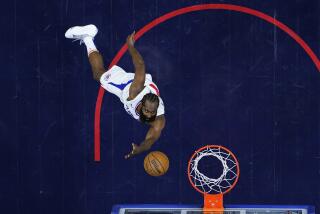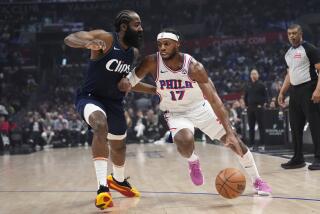Bullets Are Looking to the Draft and Next Season
- Share via
WASHINGTON — In the days after the Washington Bullets’ season came to a resounding end, the looking ahead began. Why dwell on the 134-109 humiliation at the hands of the Philadelphia 76ers in Game 5 of the first-round NBA playoff series at the Spectrum?
“We’re in an exciting position,” said General Manager Bob Ferry.
“There’s some flexibility with the salary cap that we didn’t have before. There are free agents and there are some trade possibilities, something that right or wrong we haven’t been afraid to do in the past.”
With their elimination from postseason play, the Bullets now join 14 other NBA teams who can concentrate on determining the direction of their franchises. In the upcoming weeks there are a pair of camps for college players leading up to the June draft.
At one point shortly before the conclusion of the regular season, it seemed as if the Bullets were intent upon beginning the process a bit earlier, by making a deal to get into the seven-team lottery for top draft picks on May 11. The ideal might be selecting Len Bias, Maryland’s all-America forward. According to Ferry, though, reality is infinitely more difficult.
“It’s obvious that we’d like to have Lenny Bias. The problems of getting him are also obvious,” he said. “Abe (Pollin, the Bullets’ owner) would like to have the first seven picks and so would I. But we’ve got no control of the situation.
“You can’t make a trade and leave yourself vulnerable somewhere else. It’s no good to have Bias if you don’t have a center or give up so much in a trade that you don’t have someone to play another position.”
Because the exact order of the first seven picks of the draft isn’t determined until the lottery, the best deal the Bullets could make would be speculative; making a deal with a lottery team contingent upon them being in position to draft the player that Washington wants.
According to Ferry, teams are reluctant to make that sort of trade. The only other alternative then would be for the Bullets to make a straight deal and then take their chances at coming up with one of the top three choices, of which Bias almost surely will be one. Bias.
“You have to look at what it would cost to get there and is that cost worth it,” Ferry said. “Right now, I think that the answer is no. At this point, you just don’t know who you’d get. If we wound up with the seventh selection, that could be the same guy we could’ve gotten at 12 (the Bullets’ current spot).”
Whoever the Bullets select will likely fall into one of two categories; scorer or rebounder. Coach Kevin Loughery saw Washington deficient in both areas during his 18 games as the team’s new coach.
“We’re not a particularly strong team, that was something that really opened my eyes,” said Loughery. “We do need rebounders but also more team speed and better perimeter shooting.”
Speaking of numbers, the reasons the Bullets are talking about the draft instead of the Milwaukee Bucks can be traced to a series of numbers; 68, 40, 21, 42 and 12.
Randomly, there would seem to be no logical sequence to the digits but, each fell lockstep into place for Philadelphia and added up to big trouble for the Bullets.
The first number is the 76ers’ first-quarter field goal accuracy, a hot 17 for 25 that immediately put the Bullets in an 18-point, 40-22 hole. Entering the game, it could be argued that each squad was in a relatively fragile state, the 76ers minus center Moses Malone and starting two rookies (Terry Catledge and Greg Stokes); the Bullets with their own first-year man (Manute Bol) along with almost total teamwide big-game inexperience.
“The start was everything,” said one member of the Bullets organization. “If we had hit those same shots, they would have crumpled and the results would have been exactly the opposite.”
When it was the 76ers who came out blazing, however, it alleviated a world of pressure for their younger players, according to Loughery.
“They were really pumped up, playing at home and all, but you almost like to see young players in that situation,” he said. “But then, when they got off to that start it made it easy for Catledge to just go out and play. He was never tested.”
The Bullets didn’t help matters by going nearly three minutes before getting their first basket (“We had a lot of shots we had to make early, and we didn’t,” said Loughery). Suddenly, instead of having to deal with the spotlight being on him and the onus of being the big-game replacement for all-star center Malone, Catledge could pretend he was shooting baskets in the back yard. And it seemed that simple at times for him in his 21-point first half.
Placed in the position of having to come from so far behind radically altered the Bullets’ style of play from the previous four games. In those, the team had controlled the tempo through excellent position defense, that is, taking away each of the 76ers’ favorite spots on the floor and making them struggle for shots.
“When we got down we had to just start gambling on defense more than we would ever want to,” said Loughery. “The game got too open, they had to have had 10 or 12 dunk shots.”
There were--to be exact--42 Philadelphia points scored via the fast break, one sign of the game’s overall pace. Another was the 38 assists amassed by the winners.
Twelve of those were registered by Charles Barkley, who added another facet to a series-long most valuable performance. Prior to last Sunday, the power forward had pushed and bullied his way to some big numbers--he averaged 21.6 points and 17 rebounds for the series. In Game 5, though, this second-year man dazzled the Bullets with finesse, eschewing double teams with deft passes to cutting teammates.
“Charles isn’t one to be dictated to,” said 76ers guard-forward Julius Erving. “But you could see the difference in his play from Game 1 to Game 5.
“As the series went on he progressively got closer and closer to the basket. In the first game he was making passes from the wings, (Sunday) they were coming from underneath.”
The passing was effective enough that Loughery said the Bullets decided to try to and take off the double team, rather than continue to get burned. “But then, he must have scored three baskets in no more than 90 seconds so we had to go back to it,” said the amazed coach.
More to Read
Go beyond the scoreboard
Get the latest on L.A.'s teams in the daily Sports Report newsletter.
You may occasionally receive promotional content from the Los Angeles Times.










